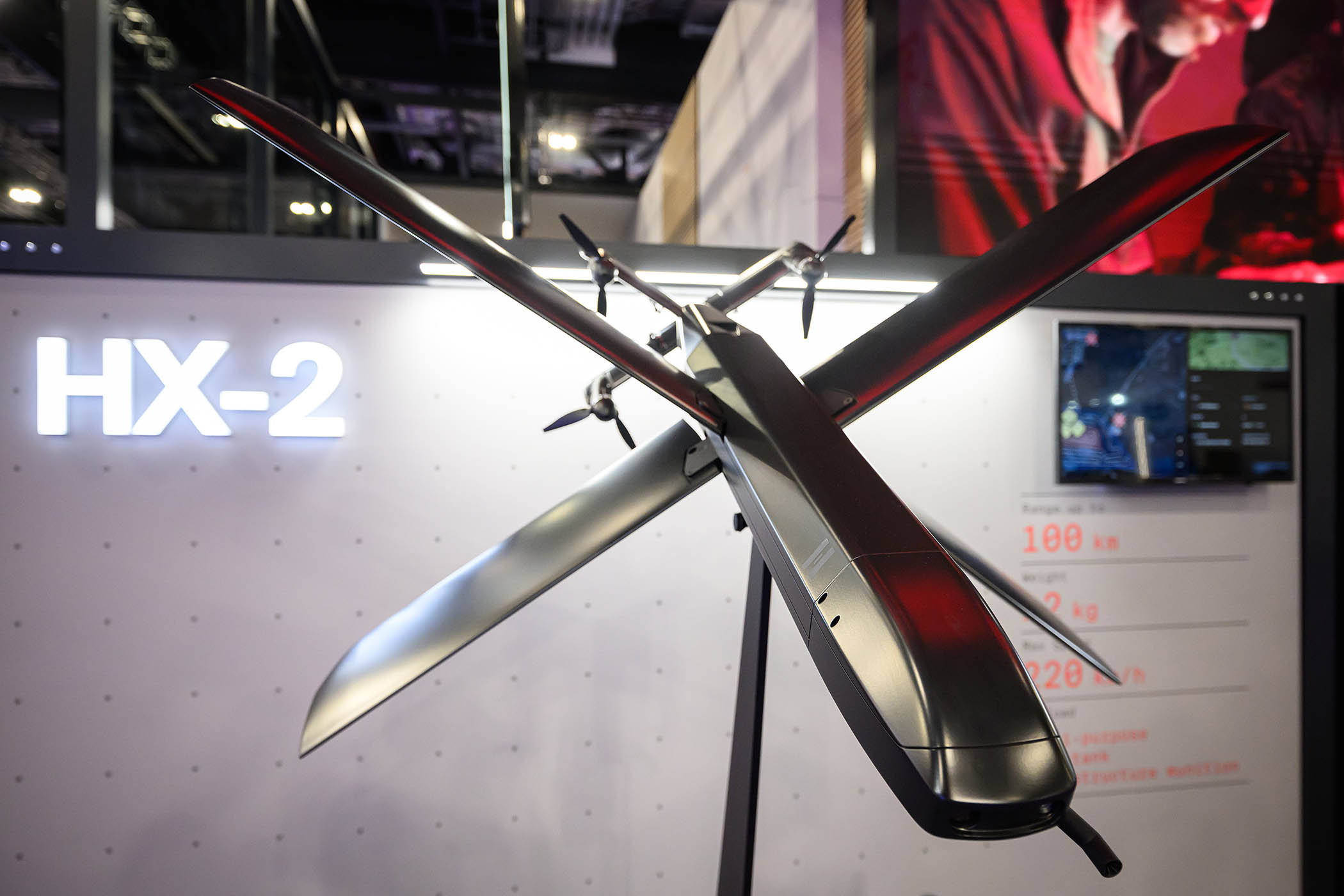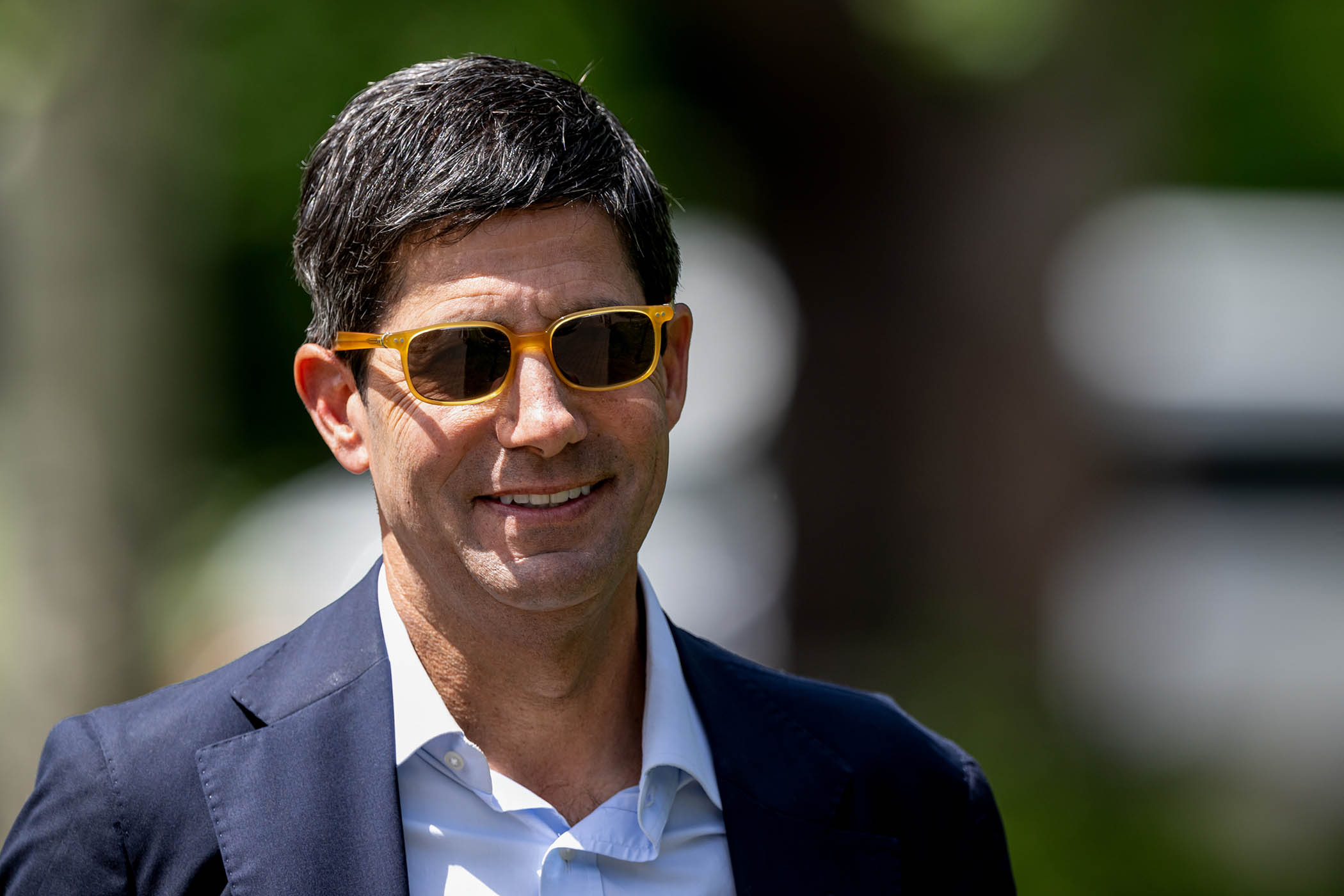At the annual Defence & Security Equipment International (DSEI) weapons bazaar this week in east London, visitors chuckled at the layout which stationed defence-tech rivals Anduril and Helsing directly facing each other. Their representatives were at pains not to look too obviously across the aisle at the other’s military hardware and guests.
With global defence spending reaching record highs the mood was triumphal. America’s Anduril and Germany’s Helsing share a punchy vision of AI software-defined defence and of the need to disrupt a status quo where prime defence contractors such as America’s Lockheed Martin, France’s Thales and Britain’s BAE Systems build exquisite, complex platforms – aircraft carriers and fighter jets and so on – at huge taxpayer expense, facing little competition.
“Anduril and Helsing are global leaders of a broad trend in which nations look beyond the prime defence contractors they have traditionally relied upon,” says Admiral Mike Rogers, former commander, US Cyber Command and former director of the US National Security Agency, now at Brunswick, the corporate advisory firm. They are the poster children for where defence is going: towards AI, autonomy and lower per-unit costs.
Both companies are taking advantage of an investment frenzy around defence-tech innovation. The value of venture capital investment in defence, much of it going towards AI and robotics, has reached $7bn (£5.16) so far in 2025, four times the level of 2022 when Russia’s full-scale invasion of Ukraine began. Global military spending rose by 9.4% in 2024, its fastest rise since the end of the Cold War, according to SIPRI, a Stockholm-based think tank.
“The defence business is growing with room for us all so there is no need to pit us against each other,” says Richard Drake, general manager of Anduril UK and Europe. The American company was founded in 2017 by Palmer Luckey, a prolific inventor who sold Oculus VR to Facebook in 2014. Yet the reality is that Anduril and younger, smaller Helsing, formed in Munich in 2021, are increasingly coming up against each other in products, geography and partnerships.
Start with products. The answer to the question of “who is the European Anduril?” when it comes to integrating software with complex military hardware is undoubtedly Helsing, which builds AI-powered battlefield software, attack drones and underwater surveillance systems. Europe boasts other notable defence-tech firms, such as Germany’s Stark and Quantum Systems, Portugal’s Tekever and Ukraine’s leading drone-maker, SkyFall (the latter is rumoured to have earned as much as $500m in revenue in the past two years), but Helsing is the most prominent and lavishly funded.
Like Anduril, with its Lattice general purpose software platform, Helsing began as a pure software play. Later on it embedded software in HF-1 drones for Ukraine’s armed forces. In late 2024, after some Ukrainian soldiers reportedly called out sometimes glitchy software – Anduril has also had criticism of its products in Ukraine – Helsing pivoted towards making its own hardware, developing its AI-guided autonomous strike drone HX-2. That takes it squarely onto the turf of Anduril and other drone manufacturers.
As for markets, Anduril sells in America, Britain and Australia and has gone global whereas Helsing sells chiefly in Germany, Ukraine and Britain. Both are competing hard this year for contracts in the UK, mounting rival charm offensives. Anduril draped its DSEI stand in Union Jack flags and Helsing boasted of products “designed in London, built in Plymouth”. Both will be focused on project Cabot, the British Royal Navy’s project to create an anti-submarine barrier in the North Atlantic using autonomous systems. As an American defence champion Anduril is positioned to make hay from Donald Trump’s state visit to Britain this week.
Related articles:
There’s more head-to-head competition to come. According to sources close to Helsing, the German company may be planning to go stateside and enter Anduril’s home market. Regarding partnerships, Anduril has begun a relationship with Germany’s defence giant Rheinmetall. In June the two announced a deal jointly to develop European versions of Anduril’s Barracuda and Fury aerial drones, and also explore opportunities to build solid rocket motors.
Helsing had its own deal with its fellow German weapons-maker dating from 2022 but its partnership with Rheinmetall ended for unknown reasons last year. It retains a partnership with Saab, a Swedish defence prime.
Newsletters
Choose the newsletters you want to receive
View more
For information about how The Observer protects your data, read our Privacy Policy
Anduril and Helsing also appear to be vying with each other for who can ramp up valuations fastest. In June, led by the investment firm of its early backer, Spotify co-founder Daniel Ek, which more than doubled its valuation from €4.5bn a year ago to €12bn. It is now Europe’s fifth-most highly valued startup, according to PitchBook, a data provider. Anduril achieved the same order of valuation jump in June when it secured a record funding round that more than doubled its worth on paper from $14bn a year ago to $30.5bn.
Helsing does not release official sales figures but is known to have won more than a dozen contracts since its founding four years ago and has total order volumes over time that are worth in the hundreds of millions of dollars. Its valuation is sky-high. Even if its annual sales have reached €200m, its valuation represents a multiple of 60x.
The equivalent figure for Anduril is 30x, with revenues of $1bn in 2024. For comparison, the stock market capitalisation of BAE Systems, at £78.5bn, represents just two times its trailing revenues, a level typical of prime defence contractors.
Even in a fizzy market it is improbable that governments are going to stump up enough to justify such valuations, says a banker who works with defence primes. “European defence ministries are unlikely to deliver 10x returns for VC funds just because they went all-in on defence tech,” agrees Toby McCrindle, a lawyer at Mishcon de Reya in London who works with defence founders.
The real question, industry observers say, is whether Helsing can stay the course against the larger Anduril, which may soon go public. The American titan has grown up in-country, bolstered by the world’s largest defence market. It took an aggressive approach early on, suing the Department of Defence to extract its first big contract.
Helsing, by contrast, has had to look across borders and contend with a more risk-averse defence establishment. It might not be out of the question for Anduril and Helsing to go into partnership together in the future. If they did, they would create a second-to-none capability in defence tech, says Naomi Hulme, co-founder and chief executive of Skyral Defence, a British company providing advanced modelling and simulation for defence and other sectors.
What is most likely to sustain Helsing is Europe’s strong desire for strategic autonomy and technological sovereignty. European leaders are unsettled by President Donald Trump’s unreliable treatment of allies, including his interest in Greenland, an autonomous territory of Denmark. When it comes to embedding AI in essential military platforms, core European nations will value the option to buy local.
But European strategic autonomy needs to translate into orders and cashflow, say Helsing’s supporters. For the moment only a tiny sliver of military budgets goes to defence-tech firms. “If Helsing fails, it will be because European defence culture and procurement did not evolve and modernise as quickly as it needed to,” says a person close to the company.
Tamzin Booth is editorial director of Economist Impact, a unit of the Economist Group
Photograph by Leon Neal/Getty


